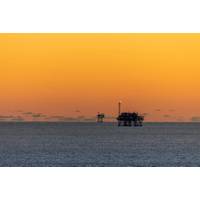Sources: Austria's 50-year relationship with Gazprom is ended by the gas seizure
Five sources said that the Austrian group's seizure and payment of Russian gas to cover an arbitration award was what triggered the end of more than 50 years gas flow from Russian state energy company Gazprom to OMV this month.
OMV is one of the last remaining gas buyers in Europe, after Gazprom lost most of its European customers in the aftermath of the Russian invasion of Ukraine. Russia was Europe’s largest natural gas supplier before the war.
OMV announced on Nov. 13, that it had won a German arbitration case against Gazprom in Germany for 230 millions euros ($239million) in relation to irregular supplies to the German unit. It would immediately take steps to enforce this against Gazprom’s invoices.
Gazprom halted gas supply to Austrian company three days later.
Three sources with ties to OMV and Gazprom claim that the Austrian company has impounded gas deliveries worth 230 million euro for October. One of the sources said it was the first instance in which a European Union client had not paid for Gazprom gas.
OMV's source said that it would take Gazprom gas for October instead of the arbitral award if Ukraine, who plans to terminate a deal to allow Russian gas to pass through its territory in the next year, stopped Russian gas flow in January.
Gazprom views the seizure of gas as non-payment, and has therefore stopped the supply.
OMV has been purchasing Soviet and Russian natural gas since 1968. The events indicate that the Austrian company is looking for ways to stop buying Russian gas despite the fact that its contracts with Gazprom run until 2040. Four of five sources who are familiar with the operations of Gazprom or OMV said this.
One of the sources stated that the stoppage of supply last week provides OMV with an opportunity to argue that Gazprom has violated the contract.
Gazprom refused to comment on the future of relations between OMV and Gazprom. OMV's spokeswoman confirmed that Gazprom deliveries have stopped and the company does not expect things to change.
OMV's seizure and non-payment of gas supplied by Russia in October has not been previously reported.
LONG-STANDING INTERFERENCE
Many gas market insiders were surprised by the abrupt end of Gazprom and OMV’s relationship. It is also a blow for Gazprom’s long-standing economic and political power in central Europe.
Austria was one of Gazprom’s most loyal clients, remaining almost completely reliant upon Russian gas, even as other EU member countries switched to imports coming from Norway, USA and Qatar by 2022.
OMV's Gazprom contracts include a clause that states it must pay even if the gas is not taken.
A second source, close to Gazprom said that Austria's large gas storage facilities made it a stronghold of Gazprom for central Europe in the past 20 years. Sources said that Austria saved billions of dollars on Russian gas since the beginning of the Ukraine war.
The two sources said that Austria was receiving Russian gas for $300-$400 per 1000 cubic metres, when the spot price traded at over $1,000 per 1,000 cubic metres during the peak of Russian supplies to Europe in 2022.
OMV has declined to comment on pricing. OMV CEO Alfred Stern said that Gazprom prices are aligned with the market.
A review of regional gas flow shows that despite Gazprom's decision to cut off OMV, Austria continues to receive Russian gas through Slovakia.
Since it stopped selling gas to OMV, Gazprom has increased its sales to Slovakia's SPP. Three of the five sources claimed that SPP resold gas back to Austrian customers.
Resales were not reported before. SPP and Gazprom declined to comment. OMV refused to confirm if they were indirectly buying gas from Gazprom through this arrangement.
CUTTING RELIANCE
One of the sources said that OMV's Stern planned to reduce its reliance on Russian Gas after taking over the role in 2021.
OMV, in addition to its action against Gazprom over the irregular supply of gas in Germany, has also launched other arbitration cases. It had written off 2.46 billion euro worth of Russian investments, after Moscow took control of stakes in Yuzhno Russkoye, a Siberian field for natural gas.
Austria's government, which owns 31,5% of OMV shares, is neutral on politics but supports sanctions against Russia.
Karl Nehammer, its chancellor, was the first Western leader who visited Russian President Vladimir Putin following the invasion. Alexander Schallenberg, the country's former foreign minister, said that a complete break from Russia is illusory.
Recent tensions have arisen. Austria's Raiffeisen Bank - the largest Western bank in Russia - had its local Russian branch frozen by a Russian Court in a separate dispute with magnate Oleg Deripaska. Raiffeisen is stuck with about 5 billion euro in Russia.
Nehammer claimed that Moscow was using energy to wage war on OMV the day Gazprom stopped supplying gas.
Nehammer is in charge of the caretaker government that has been running since a general election was won by Russia-friendly Freedom Party. The FPO, with only 29% of the votes, would have required a coalition partner in order to form a majority government.
Nehammer, who was not able to find a coalition partner, is now negotiating with the other parties in order to form a coalition that excludes the FPO.
Austrian energy minister Leonore Gewessler stated that it was up OMV to decide if they wanted to terminate contracts with Gazprom.
She said, "My job, as well as that of the federal governments, is to create framework conditions for this exit to be possible." ($1 = 0.9608 euro) (Reporting and writing by Dmitry Zhdannikov, Simon Webb and Jan Harvey; editing by Simon Webb and Jan Harvey).
(source: Reuters)




